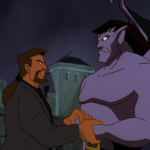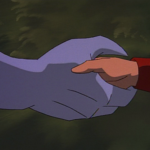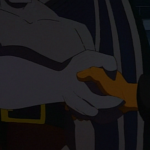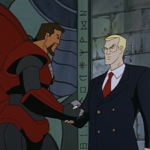
Arthur Pendragon, the Once and Future King of Britain, is awake and on a world tour that lands him in London. At the same time, Macbeth, the King of Scotland and Father of the King Hereafter, is awaiting a magical prize to drop from a gate in time and space. Turns out that the prize is Arthur and Griff. Bummer. But the search is on for Excalibur, which may in fact be in the Brooklyn Gardens. Which king is worthy to wield the legendary blade?
Miss last week’s? Read Mark of the Panther episode review.
Spoilers are in the 20/20 moments. Info from Ask Greg is in the According to Greg bits.
Season 2, Episode 35: Pendragon
Reason(s) for existence: Continue King Arthur’s story. Continue Griff’s story. To settle differences between Macbeth and Arthur. To visit the Manhattan Clan. To unite Arthur and Griff.
Main antagonist(s): Macbeth
Time(s): February 12th?, 1996
Location(s): London, England; New York City, New York, USA

We’re back with Arthur Pendragon. I really like eps with Arthur. I know this flies in the face of my villain love, considering that Arthur is one of the greatest heroes ever, but remember, he did have his flaws. So, off we go to catch up with Arthur after he left Avalon.
But first we have to visit Macbeth’s hangar. His cronies, Fleance and Banquo, are bawling around about having to go out in the windstorm that’s raging. Macbeth appears and announces that it’s the harmonic convergence, where doors open in time and space. There’s something coming, something big. Even the cronies can feel it.

Macbeth is ready for it. He apparently has experience with this phenomenon. I wonder what else he’s seen come through the gate?

At the clock tower, the gargoyles also sense a disturbance in the Force. This isn’t too hard, considering that there’s a giant storm over Manhattan, and there’s hole in the middle that may spout aliens or demons at any moment. Hudson says something is coming.

Back to Arthur. He doesn’t have his knights, his sword, or his table. Oh, or Merlin. What he has is a skiff. And it’s just landed him on the shores of London, England. Once he hops out, it sinks. So much for having a boat. Apparently, when Avalon’s done with you, it ditches you wherever its last stop is.
Griff watches as Arthur wanders about town. The king breaks into Westminster Abbey, as he wants to stand vigil. He’s shocked that the place is locked. It is rather surprising to find churches locked, but people would vandalize it if you didn’t. Gotta love the progress modern society has made. We’re so much different from the Vikings!

Arthur finds the Stone of Destiny under the throne. It zaps him when he touches it.

Griff bursts in at this point, but instead of Arthur freaking out, he relaxes. Griff is rather surprised at this, since it’s not the usual reaction from people.

Arthur asks if Griff is apart of the G’s clan. Griff says he’s not, but he is a friend.
Arthur introduces himself as Arthur Pendragon, the king of Britain. Righto, then. It’s a little less common than saying you’re the Queen or Jesus Christ, but I guess it’s still a good mental illness to have. At least that’s what Griff thinks.
Then the Stone interrupts. It says that Arthur is back early, unbidden. He’ll have to prove that he’s still worthy of holding the sword Excalibur.
Arthur of course is game, saying he’ll pull the sword from a thousand stones.
The Stone says that there’s a riddle and that he has to tell them where the sword is. Well, Art’s been asleep for who-knows-how-long. And if anybody knew where the sword was, they would have already tried to get it.
Griff pipes in with a riddle that he learned in hatchlinghood. I don’t know where this riddle came from.
“Isle of towers glass and stone,
The Lady waits for him alone;
Ebon glass in emerald frame,
Pure white lilies, speak her name;
Blood red bane in dragon stone,
Excalibur waits for him alone.”

As Arthur mulls the riddle, he mentions the isle. Well, that’s enough to give him a pass!
The stone says that it will take them to the island. Okay, I guess we’ll just hop aboard the magical transport stone.

On a building in Manhattan, Macbeth is standing in front of a brazier with his cronies. He says the same spell that’s used for the Phoenix Gate, with only a slight variation.
“Deflagrate muri intervallia!”
Burn down (the) walls of space! (Per Gargoyles Fans) (No mention of time, unlike the Gate’s spell)

The clan shows up, just as Griff and Arthur pop out of the gate. Needless to say, Macbeth is not happy. A man and a gargoyle are not the treasure he was looking for.

Arthur recognizes Macbeth from their little adventure on Avalon. Macbeth, however, does not. His memory was wiped, remember? So he’s quite confused to have a guy calling him by name and acting like he knows him – and not in a good way.
There’s no time for a chat. Arthur wants to find Excalibur.
When the clan shows up, Macbeth and Company escape.

Arthur again invokes Goliath’s name, and the clan perks up. They want to know where he saw Goliath. They say that Elisa’s Mom saw Elisa in Nigeria, and Renard saw them in Prague. They do get around.

In Macbeth’s plane, he’s plugging in a crystal ball. Yes, plugging it in. There’s a Will o’ the Wisp inside, which he summons with a spell. He sends it on its way, and it becomes his eyes and ears. It’s pretty cool, because it hooks up with the screen in his jet. This is rather amazing. It’s like Coldstone, a fusion of magic and technology. I think Mac doesn’t get enough credit. He’s actually a skilled magic user. And he’s quite interested in the powers of magic.
“Spiritus, minitus, invustrus appares.”
Tiny spirit of fire and light,
Find the ones I seek tonight.

According to Greg: from Greg’s Ramble on Pendragon
“I’ve since revealed here at ASK GREG, that the Will of the Whisp (introduced here by Macbeth, who uses both science and sorcery to control and utilize it) is the primitive magical entity that Oberon’s Children evolved from. Sort of the Homo Erectus of the magical set. (Or maybe something even more primitive like a lemur or lungfish.)
…
“Anyway, we constantly raise the question of why the sword and the Lady associated with it were now in New York and not in Britain. Of course, the short answer was that we wanted to involve Hudson & the Trio without sending them on their own World Tour. But in fact, we did have a larger purpose. We wanted Arthur to become a player on the World Stage. A larger stage, as the Lady says.”
We tend to think of magic as being Demona’s territory, especially with City of Stone. But in almost every episode he is in, Macbeth uses magic too. It would be interesting to see where he learned it.

Arthur and the gargoyles are trying to figure out the riddle. They decide their first stop should be the lake in Central Park. Arthur calls Lady of the Lake to claim the sword.

She appears.

In order for him to claim his prize, he has to prove he’s worthy. Like how your bingo card up I guess. She sends a water Elemental after him. Art yells for the clan to shoot it with one of Macbeth’s lightning weapons that they stole earlier. For some reason, this works on the Elemental.

It’s enough to prove his leadership ability. I don’t know why, since it doesn’t take too much leadership ability to say shoot. It’s not like he’s leading a troop into battle or organizing a birthday party.
She says that the sword is in the stone and waits for the Timeless King. She shows them the image of a stone dragon in a maze. A sword is in its heart.
So off they go to destroy more things at the Brooklyn Gardens. I mean, claim the sword.
Macbeth watches all this on his will-o’-the-wisp screen. Banquo says that Macbeth is pretty old, so why does it mean Arthur is the one to claim it? That sounds good to Macbeth.
The clan arrives at the Brooklyn Gardens, but so do Macbeth’s cronies. An air fight ensues. It’s all very fancy and exciting. Go watch it.

We’re really only concerned about Macbeth and Arthur. Macbeth runs up to the dragon and pulls a sword out of its heart. He’s exalting because he thinks that he’s pulled Excalibur out. Meh, too easy, buddy.


Arthur is ready to admit that Macbeth is the king, but Griff says to fight for it.

They don’t get too much of a chance to fight, because the dragon wakes up. Now they have to fight it. .
What is going on? What’s all this magic doing in New York? Suddenly Central Park has the Lady of the Lake? Brooklyn has a magic dragon and Excalibur? Other than the fact that this is a good way to bring in the clan, there’s no explanation for this. You’d think that everything would be over in Cymru (Wales), like it was at first. That’s the reason the Cymry have a red dragon on their flag!
As they fight the dragon, the sword goes flying. Arthur grabs it. Then he realizes this is not Excalibur. It promptly breaks. The real Excalibur does not break. It’s a slight but key difference.


Be that as it may, it’s time to fight the dragon. It grabs Macbeth and Arthur, then launches into the sky. It must be soaked in magic, because there’s no way that a stone dragon is going to fly.

The clan finishes up with the cronies, then uses their scooters to get in the air. But they’re way behind the magical flying Stone Dragon. Not sure why.
The kings begin to argue while in the grip of the dragon. Mac says they could defeat the thing if Arthur hadn’t had broken the sword. Arthur says it’s not the right sword.

And then he realizes the sword is inside the dragon. The bane is the reds tone in the dragon’s heart. With Griff’s help, Arthur frees himself enough to slam his mace into the ruby. Fire gushes out, and he calmly reaches in and pulls out Excalibur. Wow.

Unfortunately, this is also going to kill the dragon. It crumbles, leaving them in midair with a cloud of dust.

Griff grabs Arthur, and the clan grabs Macbeth. That was good of them. Wonder if they would have caught any of the other antags?
Macbeth bows before the true king. He’s an honorable man, and knows when he has lost to a superior.

Arthur is also quite honorable. He offers to make Macbeth a knight of the Round Table.
Now, you’d think that would be pretty cool. But Macbeth says he’s been a king for too long to serve any man. Indeed, kings serve themselves, unlike representatives or presidents, which are supposed to serve the people. But he says that if Arthur ever needs him, he will come to his aid and stand beside him.








Everyone returns to the clocktower – except Macbeth and company, of course, who go back to his place. At the clocktower, Arthur says he will continue exploring. Plus, he has to get Griff back. Griff, however, doesn’t really want to go back. He wants to see the world.
Art turns back and says that only a knight can travel with him, seeing as he’s the king.
Griff is crestfallen, literally, but says he understands. It was fun anyway, and now he has a story to tell the hatchlings, if he ever has them. It’s rather interesting that he seems to consider hatchlings more like a human considers their children, unlike Goliath’s view that the hatchlings are communal property.
According to Greg: There should have been a spinoff with Griff and Arthur. It never happened, but how cool would that have been!
Then Arthur turns and says he is making Griffin knight. This is a really nice ending, and it does a good turn for Griff, who should be knighted for his service to the UK during the Battle of Britain during World War II.

I appreciate how they end this episode. Macbeth was fighting for the right to be king. He has been, so it’s not as if he doesn’t have any claim. They allowed him to keep his honor and respect. Arthur got to look even better by being honorable to his enemy who had surrendered. He could have just tried to kill Macbeth.
Final Thoughts
Macbeth is an interesting antagonist. He can be ruthless, but he’s also very honorable. He doesn’t take unfair advantage, though he does take every advantage he can get. If it means he works with Xanatos, so be it. If it means he uses magic, then bring it on. However, he would not kidnap the gargoyles while they were in their stone sleep, which would make way more sense than waiting until they woke up. So, he suffers from the same problem that all honorable characters do: he’s not always pragmatic. And that costs him.
Then again, Xanatos has a type of honor. It’s really based on the fact that he likes a good challenge, but remember, he always stops Owen from breaking out the sledgehammer when the chief of security wants to take out the gargoyles. Xanatos could have destroyed the gargoyles many times over. But he does not. Again, this is less from honor and more from enjoying playing with them. It works out to be the same thing for the gargoyles, which is amusing in itself.
What will this mean for Macbeth? Will he support the gargoyles more? Or will he continue to view them only as opponents? Truly, he only considers them opponents because they get in the way. He doesn’t seek out their antagonism; he just fights them when they get in his way. He did kidnap them at first, but that was only to draw Demona. He had no actual interest in the clan. Overall, this describes his view of them: they exist only when they get in his way, but otherwise they’re a nonentity.
The symmetry of the two kings is a great idea. The writers pull it off well.
It’s also satisfying to see Macbeth have the chance to make amends with King Arthur.
Hey, I’m gonna cut the writers a break and say that NYC is just as magical as London. So there.
Tune in next week for Eye of the Storm. We see what happens when Goliath goes uber protector with the help of the Eye of Odin. Ahg, how much longer is this Avalon trip going to be! I’m homesick for NYC.
Thoughts? Comment!